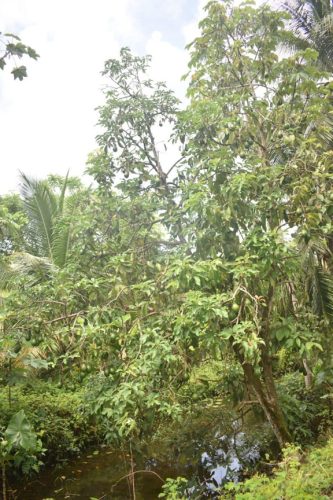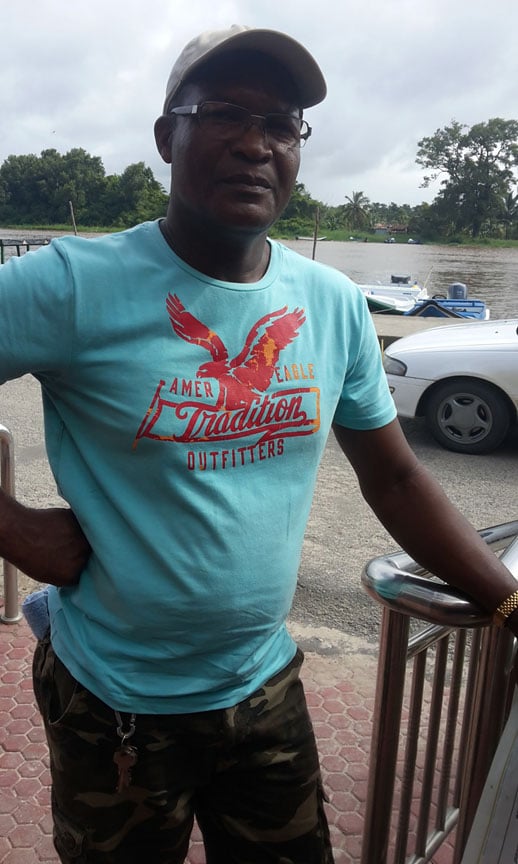x Inhospitable weather conditions and a scarcity of inputs that are important to the ‘good health’ of the agriculture sector are largely responsible for the doleful mood that appears to have swept over some farmers who live and work in Essequibo. Many of them appear to be too ‘intimate’ with the situation to want to engage in any prolonged discourse on a matter which, these days, they must sleep and wake with.
One Pomeroon farmer, Wendel Daniels, with whom the Stabroek Business ‘caught’ up at Anna Regina recently, agreed to speak, seeming wearied by a lack of opportunity to ‘exhale.’ On the position of those farmers who simply avoid the media is, perhaps, understandable. In many instances their experiences have been debilitating.
It was different with Wendel. He spoke, seemingly, because he found the occasion to be an opportunity to ‘exhale,’ to verbalize the travails his travails in a sector which, in some instances, is currently being brutalized by the heat.

The Essequibo Coast and Pomeroom River have a tradition for ‘delivering’ its fair share of the fruit – mostly coconuts, oranges, avocados – cultivated in Guyana. That tradition would appear to be on the wane. Some farmers, Wendel says, are now hard-pressed to fill their routine orders. He blames this on the protracted ‘heat waves’ that descend on the farms, retarding production to an extent that has reached alarming proportions. The phenomenon has seriously impacted the farmers’ ability to fill their routine orders for agricultural produce.
The Stabroek Business spoke with Wendel at Anna Regina shortly after he had dispatched a truckload of dried coconuts to Georgetown. The look on his face suggested that the ‘filling’ of an order was a major accomplishment.
A resident of Unity, Pomeroon, Wendell related to the Stabroek Business a succession of weather-related events including spates of temperature rises that have wreaked havoc with farming. On his own farm harvesting dipped to around 75% of the customary yield and his was by no means a unique experience.
He provides the example of dry coconuts. He has to provide 60,000 per week. For the last two years he ‘fell short’ on the 60,000.00 dry coconut order that had to be reduced to 15,000. In this instance he found himself ‘falling short’ on a contract which he had held for the past eighteen {18} years. He blames the loss of market and, by extension, the loss of income on the relentless heat. “I’m struggling to reach my quotas,” he says. The pain in his voice is distinct.
Daniel is a ‘Pomeroon River man.’ He followed his father into farming. He has an intimate knowledge of ‘the behavior’ of coconuts, being able to determine at an early stage the number of fruit that a coconut tree is likely to bear. These days, there are times when the yield can decline by as much as 80% -90%……….and more. Wendel believes that coconut farming in Pomeroom River has become pretty much a ‘lottery game.’
Wendel considers this a tragedy. Coconut water is, globally, a high-value commodity, particularly, in hot weather. Ironically, it is the temperature that the coconut has to endure In Wendel’s opinion, that has caused the situation has grown worse over the past two years, His own supply needs of 5,000 water coconuts per week, have, all too frequently, been unattainable. “Some weeks I barely scrape 1000. This is how stressful the situation has become” he says,
Usually, Wendel brings his ‘nuts’ to Charity where he sells to Wholesalers. The profit margins, he says, are “not great.”
Wendel ‘turns sixty’ in 2025. He has been a farmer for forty six years. Retirement beckons and he intends to pass the reins to one of his sons whilst “overseeing things” from his more ‘laid back position. The choice of successor has, seemingly, selected itself. One of the two boys has already declared his disinterest in farming.
Wendel himself recall his own apprenticeship to his father animatedly. It was a salaried job. “I started at ten dollars a day,” he says. You work throughout the week and you get paid on Fridays. “These days workers demand as much as between $8,000.00 and $10,000.00 per day.
There are other current challenges that concern Wendel. The coconut trees on his farm are dying. If the present heat wave continues to December all my coconut trees will die, he says.
Momentarily, he appears dejected. In the instances of many trees the swaying in the wind’ has ceased. The once vigorous green branches now denuded of their green leaves are mostly still while the trunks stand less than erect on expanses of land that appear to be ‘in mourning’ for the depletion of their vegetation.
These days, Wendel says, he prefers the rainy weather. It serves as a reprieve for the trees from their grave-like dryness. The season of dry weather has meant that he has had to let some employees ‘go.’
Momentarily he turns to his other crops, avocado orange, banana and plantain. Decidedly less sturdy than coconut these have long mostly ‘gone under’ to the sustained, blistering heat. His staff these days amounts to one man standing, tasks are limited to spraying and weeding.
What remains is a much smaller cash crop venture. This, to a greater extent, is consigned to home use, a cost-saving venture when the prices of fruit and vegetable in the markets are considered. His most recent Avocado crop he says, was an unmitigated disaster. Returns from oranges and plantains, to some extent, provide a measure of compensation
Gradually, Wendel finds himself slipping into a less vigorous regimen.
There are times, Wendel says, when, in moments of unbridled optimism, he contemplates expansion. In his more sober moments, however, his enthusiasm wanes. That, he says, is a decision that his successor will have to make.




